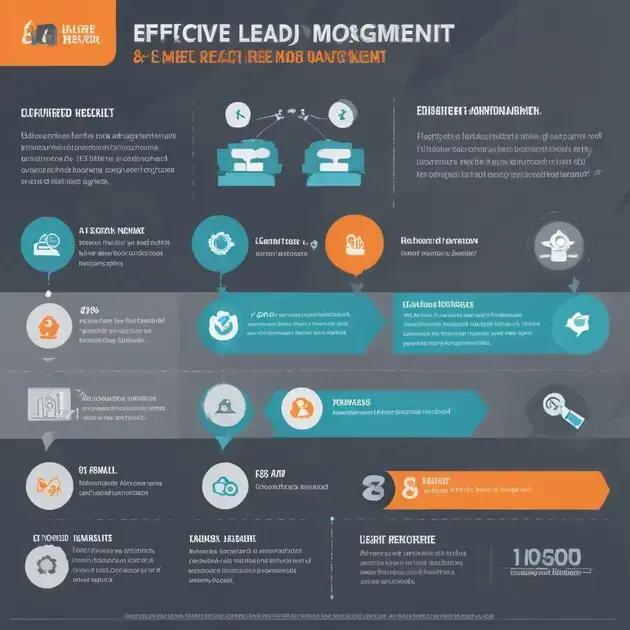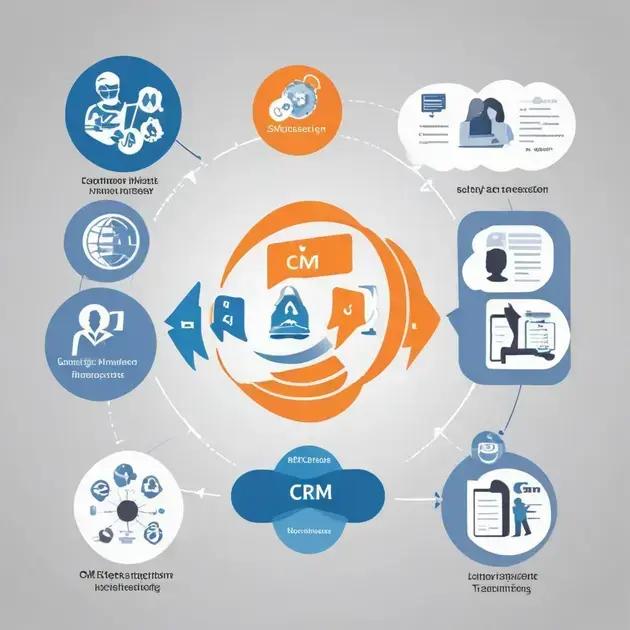CRM lead management is essential for businesses aiming to optimize sales processes by effectively capturing, nurturing, and converting leads into loyal customers. Implementing a tailored CRM system, personalizing communications, and avoiding common pitfalls can significantly enhance lead conversion rates and overall customer relationships.
CRM lead management is a game-changer for businesses aiming to elevate their sales processes. By effectively managing leads through a CRM system, organizations can not only streamline their sales workflow but also nurture potential clients with personalized communications. In this article, we will dive into essential strategies, the benefits of effective lead management, and how to implement a successful CRM system that will drive your sales success.
Understanding CRM Lead Management
Understanding CRM Lead Management is crucial for businesses that aim to optimize their sales process. Lead management involves tracking and managing potential customers throughout their buying journey. By utilizing a Customer Relationship Management (CRM) system, organizations can streamline this process, ensuring that no leads fall through the cracks.
CRM lead management encompasses several key components, including lead capture, lead nurturing, and lead qualification. Lead capture refers to gathering information from potential customers through forms, social media interactions, or other channels. Once leads are captured, the nurturing process begins, which involves engaging with leads through targeted communications, such as emails and personalized messages, to build relationships and guide them toward making a purchase.
Additionally, lead qualification is essential. This is the process of determining which leads are most likely to convert into paying customers. By analyzing lead data and behavior, businesses can prioritize their efforts, focusing on the leads that show the most promise.
Overall, effective CRM lead management helps organizations improve their sales efficiency and enhance customer relationships, ultimately driving higher sales and growth.
Benefits of Effective Lead Management

Benefits of Effective Lead Management are essential for any business that wants to thrive in a competitive environment. When companies implement a solid lead management strategy, they can realize significant improvements in their sales processes.
One of the main benefits is increased efficiency. An effective lead management system helps teams prioritize leads based on their likelihood to convert. This means that sales representatives can spend more time engaging with leads that are most likely to lead to sales, rather than chasing less promising leads.
Another benefit is improved customer relationships. By nurturing leads through personalized communication, businesses can build rapport and trust. Customers feel valued when they receive targeted messages that address their specific needs and pain points.
Effective lead management also allows for better data analysis. Tracking lead activities and interactions provides valuable insights into customer behavior and preferences. This data can be used to fine-tune marketing strategies and improve product offerings.
Additionally, businesses can see a higher conversion rate as a result of effective lead management. When companies have a clear process to engage and nurture leads, they are more likely to turn those leads into loyal customers, ultimately driving revenue growth.
Key Strategies for CRM Success
Key Strategies for CRM Success are vital to maximize the potential of your lead management efforts. Implementing the right strategies can significantly enhance your business’s ability to convert leads into loyal customers.
One key strategy is to define clear goals for your CRM system. Knowing what you want to achieve, whether it’s increasing sales, enhancing customer service, or improving lead conversion rates, will help you choose the right features and metrics to focus on.
Another important strategy is to integrate your CRM with other tools. Connecting your CRM with marketing automation, email platforms, and analytics tools can provide a comprehensive view of your customer interactions. This allows for better data tracking and personalized communication.
Training your team on how to effectively use the CRM system is essential. Regular training sessions can ensure that everyone understands the system’s capabilities and how to leverage it for better results. Empowered employees are more likely to utilize the CRM effectively.
Additionally, continuously monitor and analyze performance. Regularly review your CRM data to assess how well your strategies are working. Use this information to make informed adjustments and improvements to your lead management processes.
Finally, don’t forget the importance of personalization. Tailoring your communication and offers based on lead data and behaviors can significantly increase your chances of conversion.
How to Implement CRM for Lead Management

How to Implement CRM for Lead Management is a crucial step for businesses looking to streamline their sales processes. The implementation process can be broken down into manageable steps that ensure success.
First, it’s important to choose the right CRM software tailored to your business needs. Consider factors such as ease of use, customer support, features, and pricing. Look for a CRM that offers lead management capabilities, including tracking, scoring, and automation features.
Next, define your lead management process. Outline how leads are captured, categorized, and nurtured. A clear roadmap will help everyone in the organization understand their roles and responsibilities when handling leads.
Data migration is another key step. Moving existing customer and lead information into the new CRM should be done carefully. Ensure data is clean and organized to avoid future complications.
Once the setup is complete, train your team. Provide comprehensive training sessions to help team members understand how to navigate the CRM effectively. Encourage them to explore its features and how to utilize them for lead management.
Finally, monitor and adjust your CRM usage regularly. Gather feedback from users and track key performance indicators to identify areas for improvement. This ongoing process will help refine your lead management strategy and optimize your CRM usage for better results.
Common Pitfalls in Lead Management
Common Pitfalls in Lead Management can hinder the success of your sales efforts. Recognizing these challenges is the first step in avoiding them.
One major pitfall is neglecting lead follow-up. Failing to follow up on leads promptly can result in lost opportunities. Businesses must establish a follow-up system and ensure that team members are aware of lead response times to maintain engagement.
Another issue is insufficient lead qualification. Not all leads are equal, and treating every lead the same can waste resources. It is vital to implement a lead scoring system, which helps prioritize leads based on their potential value and readiness to buy.
Overlooking data quality is another common mistake. Inaccurate or incomplete lead information can hinder outreach efforts. Regularly cleaning and updating your lead database ensures your team has the most reliable information when reaching out.
Additionally, lack of personalization can turn leads away. Generic communications tend to get overlooked. Tailoring messages to address the specific needs and interests of your leads can significantly increase engagement levels.
Finally, failing to track results is a critical oversight. Without proper monitoring of lead management processes, businesses cannot measure success or identify areas for improvement. Using analytics tools to evaluate performance will help fine-tune your strategies.
In Summary: Mastering CRM Lead Management
Effective CRM lead management is key for any business looking to improve sales and customer relationships. By understanding the basics of lead management, implementing strong strategies, and avoiding common pitfalls, your organization can thrive.
With the right CRM tools and processes in place, you can capture, nurture, and convert leads into loyal customers. Remember to track your results and continuously refine your approach to achieve the best outcomes.
Embrace the potential of CRM lead management to elevate your business and drive greater success in your sales efforts.
FAQ – Frequently Asked Questions about CRM Lead Management
What is CRM lead management?
CRM lead management involves tracking and managing potential customers throughout their buying journey to improve sales effectiveness.
How do I choose the right CRM software?
Consider your business needs, user-friendliness, support services, and specific features such as lead tracking and automation capabilities.
Why is timely follow-up important in lead management?
Timely follow-up keeps leads engaged and increases the chances of conversion, preventing potential customers from losing interest.
What should be included in a lead qualification process?
A lead qualification process should assess leads’ readiness to buy, their needs, and how well your products or services match those needs.
How can I personalize communications with leads?
Analyze lead data to understand their interests and preferences, then tailor your messages to address those specifics for better engagement.
What tools can help track lead management performance?
CRM analytics tools allow you to monitor lead interactions, evaluate conversion rates, and identify areas for improvement in your lead management strategy.




